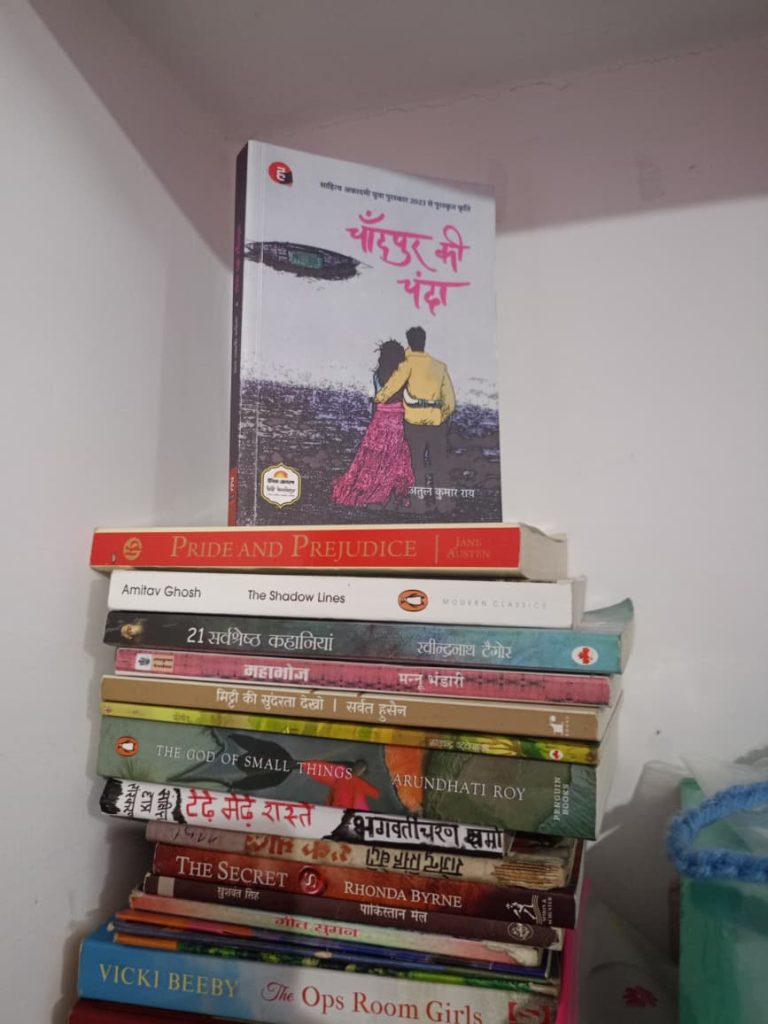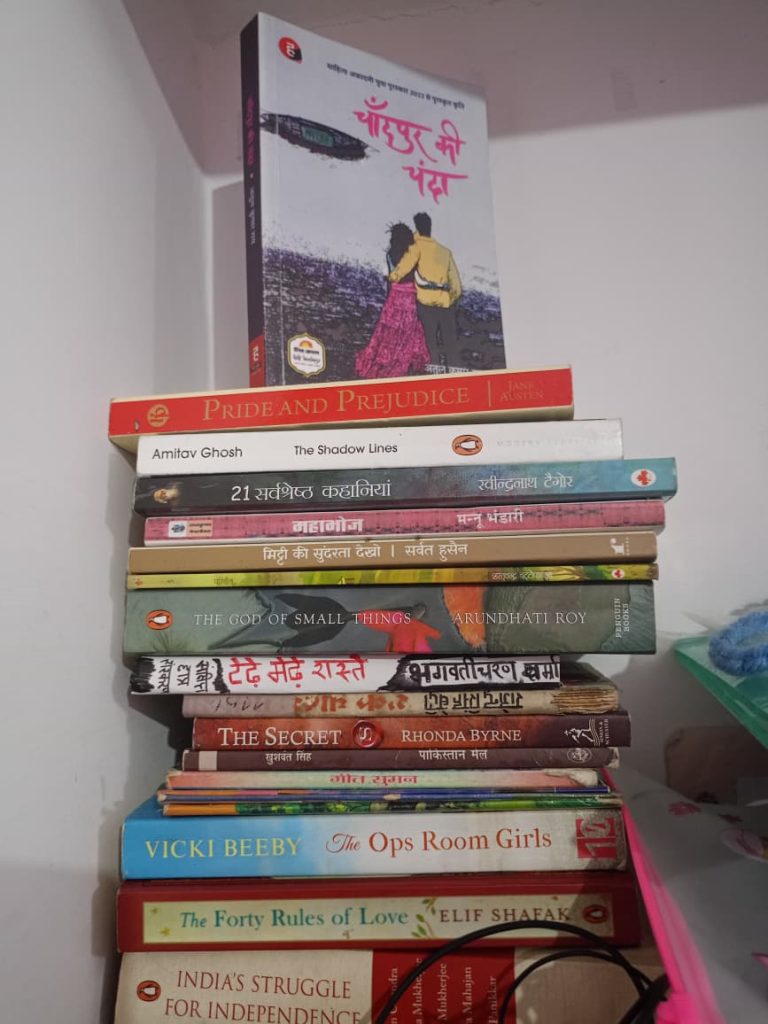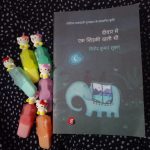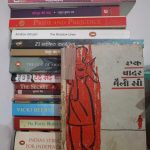
“चाँदपुर की चंदा” पढ़ोगे तो लगेगा जैसे कोई फिल्म चल रही हो—गाने भी, मस्ती भी, और थोड़ा ड्रामा भी। अतुल कुमार राय की ये किताब बाकी कहानियों से हटकर है—सीधी-सरल भाषा में दिल छू लेने वाली बातें।
गाँव की असली झलक
कहानी में चाँदपुर गाँव की तस्वीर बिलकुल सामने आ जाती है। गाँव में घुसते ही टूटी-फूटी सड़कें और गड्ढे दिखेंगे, और समझ आ जाएगा कि सड़क से ज्यादा जेबें भरी गई हैं। चाँदपुर सरयू नदी के किनारे है—हर साल बाढ़ आती है और लोगों की जिंदगी फिर से शुरू करनी पड़ती है।
यहाँ की चंदा जितना दुख झेलती है, उतनी ही खुलकर बोलती भी है—बेबाक और हिम्मती। पिंकी जिद्दी है, पढ़ना चाहती है, पर घर-समाज बार-बार अड़ंगे लगाते हैं। मंटू उसका पक्का दोस्त है—समझता है, साथ देता है, और उसका सबसे बड़ा सपोर्ट सिस्टम बनता है।
हंसी-ठट्ठा और चुभता व्यंग्य
लेखक ने जगह-जगह ऐसा मज़ाकिया टच दिया है कि पढ़ते-पढ़ते मुस्कान आ जाती है। पंचायत भवन के बाहर झूलता ताला, गाँव के नेता, और यहाँ तक कि गाँव के साँड़—सब मिलकर सिस्टम पर मज़ेदार तरीके से तंज कसते हैं। पंचायत घर में बैल-गाय आकर जैसे अपनी पंचायत कर लेते हैं, और जाते-जाते गोबर से “फैसला” सुना जाते हैं—सीन बिलकुल जिंदा हो उठता है।
छोटे-छोटे डायलॉग, बड़ा असर
कहानी में ऐसे छोटे-छोटे संवाद हैं जो सीधे दिल में लगते हैं। जैसे—“अगर गाँव में लड़कियों को पढ़ने की इतनी कमी है, तो उनके सपनों को लॉक करने का थोड़ा-सा भी हक किसे है?” और कवि चिंगारी का यह मज़ेदार दर्द: “इश्क की पढ़ाई तो हमने A to Z किया, हाय! हमने क्यों नहीं B.Ed किया।”
इमोशन, ठहाके और सच्चाई
कहानियाँ तभी याद रहती हैं जब वो हँसा भी दें और रुला भी दें—यही इसकी खूबसूरती है। आज के गाँव की जो सच्ची फोटो है, वो हर पन्ने में झलकती रहती है—लोग, उनकी लड़ाइयाँ, उनके सपने और रोज़-रोज़ का जुगाड़।
मेरे पसंदीदा हिस्से
- “ढिबरी में तेल नहीं, झोपड़ी अंधेरा है / पिंकी तेरे प्यार में जीना बेकार है”
- “तुम्हारे प्रेम में पागल, शशि उर्फ मंटू, चाँदपुर”
- “जग तुझको दूर जाना, जग तुझको दूर जाना” — महादेवी वर्मा
Chandpur ki Chanda Book Review: Feels Like a Film

Read “Chandpur ki Chanda” and it’ll feel like a movie is playing—songs, fun, and a dash of drama all at once. Atul Kumar Rai’s book stands apart from others—simple language, straight-from-the-heart storytelling.
The real face of the village
The story brings Chandpur village right before the eyes. The moment one enters the village, there are broken roads and potholes everywhere, making it clear that pockets got filled more than the roads did. Chandpur sits by the Sarayu River—every year floods come, and people have to start their lives all over again.
Pinky, and Mantu
Chanda here suffers a lot, but speaks up just as boldly—fearless and gutsy. Pinky is stubborn; she wants to study, but home and society keep throwing hurdles in her path. Mantu is her solid friend—he understands her, stands by her, and becomes her biggest support system.
Humour and sharp satire
The author sprinkles witty touches throughout, bringing a smile as one reads. The padlock dangling outside the panchayat building, the village leaders, and even the village bulls—all come together to poke fun at the system in a playful way. Cows and bulls wander into the panchayat hall as if to hold their own “meeting,” and leave after dropping dung—as if that’s the final “verdict”; the scene comes alive.
Short dialogues, big impact
The story has crisp dialogues that hit home. For instance: “If there’s such a shortage of education for girls in the village, who has even a little right to lock their dreams?” And poet Chingari’s humorous pain: “इश्क की पढ़ाई तो हमने A to Z किया, हाय! हमने क्यों नहीं B.Ed किया।”
Emotion, laughter, and truth
Stories stay with us when they make us laugh and cry—this is the charm here. The true snapshot of today’s village—its people, their struggles, their dreams, and daily jugaad—keeps glimmering on every page.
Let me know what you think about the book in the comments!

